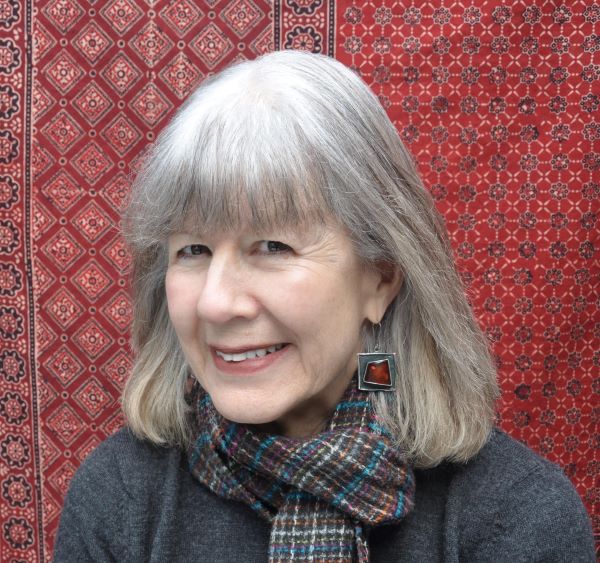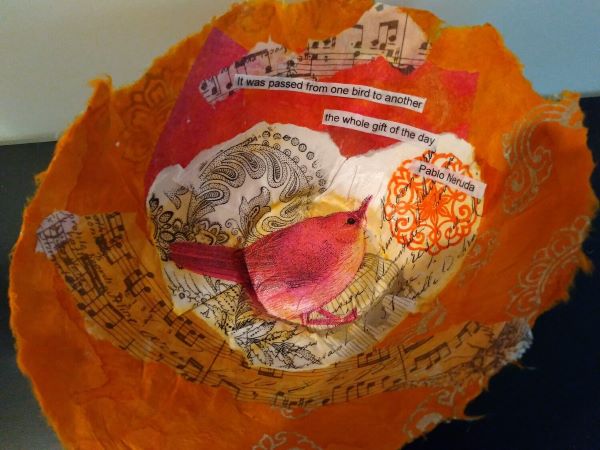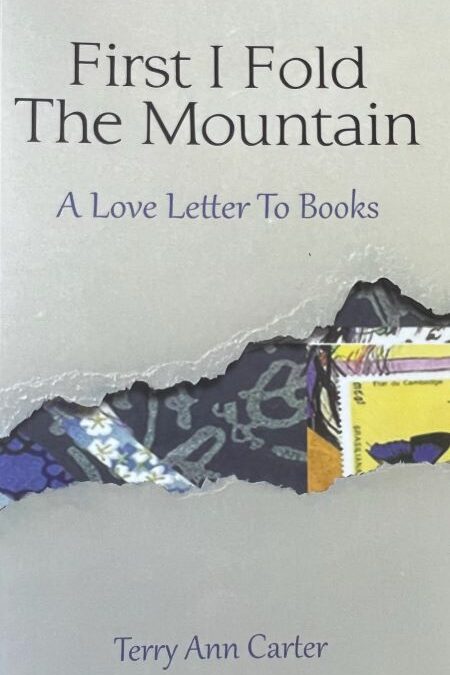bookmaker
first I fold the mountain
then the valley
The haiku above opens poet and paper artist Terry Ann Carter’s eighth book of poetry, First I Fold The Mountain: A Love Letter to Books (Black Moss Press, 2022). Terry Ann is also a bookmaker and very possibly “a paper queen wearing stars in my hair.”
The quoted line is from “Tearing Down the Papers Just Before Summer,” a poem “after American poet Malachi Black.
Part l of this beautiful collection, Tearing Down the Papers, gets its title, as does the poem, from “an expression that bookmakers use when preparing large sheets of paper for book interiors.”
The poem’s speaker says:
Pulling from my fingertips
so as not to rouse the kitten
this late night meditation on book
making on thoughts of wizardry.
This poem and those that follow, are celebrations of Terry Ann’s creative wizardry and are such a delight to read and see on the page.
“Each gorgeous poem is the pleasure of experiencing a creative life and responding to the wonder of being alive on this earth,” says Micheline Maylor, a poet and past Poet Laureate of Calgary, in one of the book’s endorsements. I very much agree with Micheline.
Other “tearing down” poems in Part 1 include “Tearing Down the American Papers” (after Walt Whitman) and “Tearing Down the Ghost Papers Found in the Bottom Bureau Drawer” (after Emily Dickinson).
One of the poems, “Papery,” is a gorgeous reflection of childhood memories including “my father cuts a square out of a grocery bag.” As for mother: “My mother prefers paper dolls.”
The speaker of the poem says: “I paste over the record covers and create / secret houses for imaginary friends . . “
The poem brings us into the present with:
Today I work in my studio learning mountain valley
folds from a physics professor at Stanford who
teaches advanced origami. I will make a book called
Kitchen Utensils as Sonar Devices: A Handbook
from folded bits of a brown paper bag and three
pieces of thread.
I love the imagination at play here.
“Grimoire” describes something women carried in their apron pockets
small enough to curve fingers around.
A text in code. Some say the grimoire
was for black arts. Magick with a “k”.
Such a small book for casting spells.
Spellbound.
The speaker reflects on “the memory of dark” and “Christmas roses”:
And I bury
my face in the spell of their
planting, which I did with you
last summer, your fingers frail
beneath the rotting leaves.
How we enjoyed the day, the dark
falling on our shoulders like rain.
Clouds breaking open like sea water.
While names in the poems can mention faraway places, Panama for instance, and Singapore, “Rock Hunting with Basho on Dallas Road” is close to home. She lives in Victoria.
The poems that celebrate written books are such a pleasure; I’d like to quote from each of them.
How about the unwritten books? I’ve been reading Almost Islands by Stephen Collis about his friendship with poet Phyllis Webb and the poems she didn’t write during the more than two decades before she died – still, she was called a poet. And reading Terry Ann’s book with its second part, The Unwritten Books has me particularly excited.
Terry Ann said in a guest blog she wrote for Richard Osler’s “Recovering Words” that the book, Inventing Imaginary Worlds: from Childhood Play to Adult Creativity Across the Arts by Michele Root-Bernstein, was a “spring board” for this section of her book in particular. She was also inspired and “gathered momentum” from Jorge Luis Borges’ short story “The library of Babel” about books that have yet to be written.

“This notion set my imagination on fire,” Terry Ann said. [Photo of Terry Ann Carter by Rhonda Ganz]
A beautiful example of a poem from The Unwritten Books section is “Self-Portrait as Things Lost (from The Book of Blue Revelations). There is a profusion of blue in the poem: a “blue door;” “azure skies;” “blue and white willow ware;” “a blue blanket;” and “blue: azul,”
It’s a splendid poem about place, memories of childhood, a “dear husband” and “the searching for / what has gone.”
Here’s one of the stanzas:
Muir was right. It is paradise here. My blue
notebook open once again, across the blue
veined intimate blank of the page. I begin to trace
what has been lost to the dark.
A particularly poignant stanza, a door into the intimacy of a blank page.
There’s some humour in “In Honour of My Visit to Paris.” It’s “from The Brassiere Book” as the speaker has decided “to name my breasts Gertrude (the larger one) / and Alice (the smaller) on the occasion / of a literary tour . . . “
The sparkling mind of Terry Ann Carter wonders what Matisse had for lunch in “Oranges” (from The Book of Firelight).
I have often wondered what Matisse had
for lunch the afternoon he painted Still
Life with Oranges
And then the speaker reminisces about “a first love affair, the city of Montreal” and I find myself humming as a young man strums a guitar: “His voice like Leonard Cohen’s / nudging you with oranges that come all the way / from China . . . “
Part III is entitled night orchids – husband/wife (a dos-a-dos book).
Heather Weston, book artist, author and educator, provides the definition: “The dos-a-dos, from the French for ‘back to back’ binds two books with one cover or case. Although simple in structure, the binding allows the book to be divided into two distinct sections, offering the possibility of introducing contrasting or separate material within one book.”
The poems composed are in the voice of a wife and a husband, struggling with illness. Terry Ann has said: “These poems are based upon my own experience, and the closest I’ve come to writing about my husband’s illness and death.”
There are sub-sections titled wife, and husband. Here’s a beautifully tender one from wife:
Rehearsal
first night we slept together
after your terminal diagnosis
i learned to stretch my body
like a curve of driftwood up
and down the bed like a loon’s call.
I remember the way you closed
your eyes letting your fingers
touch the pillow and then my hair
as though you were practicing
for the day you would be leaving
for good. as if this were the only thing
that mattered.
In “Compass,” the speaker wonders “who is this man, in bed, next to me, who is he?” and later states: “loneliness is a strange companion, bags always packed.”

[Illustration of one of Terry Ann’s marvelous paper bowls; this one an offering to Pablo Neruda with lines from his poem “Bird”.]
Part IV: The Hanging Books for Kurt Schwitters is named for Kurt Schwitters (1887 – 1948), a German painter, sculptor, typographer and writer who designed collages and assemblages. In the autumn of 2018, Terry Ann created The Hanging Books for Kurt Schwitters for a book arts exhibition at the Gage Gallery in Victoria, B.C.
The books “were designed from a used paint cloth cut into four strips approximately seven feet tall by two feet wide. The ‘strips’ of paint cloth were collaged with text (in German) of a Goethe poetry collection, rusted nails, old photographs of the Rhine River, bits of handmade paper, matchsticks” and many other found bits and pieces including “lines from poems I had written about Kurt Schwitters.”
You’ll find the words to the four hanging books in First I Fold The Mountain and delightfully, the fourth book is for Anna Blume, Kurt Schwitters “imaginary mistress.”
Part V of First I Fold the Mountain is: Blue Moon – the Ono no Komachi Scroll Books. “Scroll books were the first form of editable record keeping texts, used in Eastern Mediterranean and ancient Egyptian civilizations. Parchment scrolls were used by several early civilizations before the codex, or bound book with pages, was invented by the Romans.”
In 2020, Terry Ann published a chapbook with JackPine Press entitled Blue Moon: the Ono no Komachi Poems. The handbound, handmade book was designed by Heather MacDonald, a fellow book artist and poet friend of Terry Ann’s. (Ono no Komachi, a Japanese poet, was born in 825 AD.)
Here’s a poem to savour from Blue Moon:
From my doorway
I see the seaweed gatherer
doesn’t he know
there is a harvest, here,
in my arms?
Terry Ann Carter’s imagination, explorations, wizardry, quiet contemplations as well as exciting discoveries make First I Fold the Mountain such a treasure. It has filled me with ideas and inspiration and that’s what a good book does. Those of us who have been keen readers since childhood ought to be writing our own love letters to books.
Do ask for a copy of First I Fold The Mountain at your favourite bookstore.

